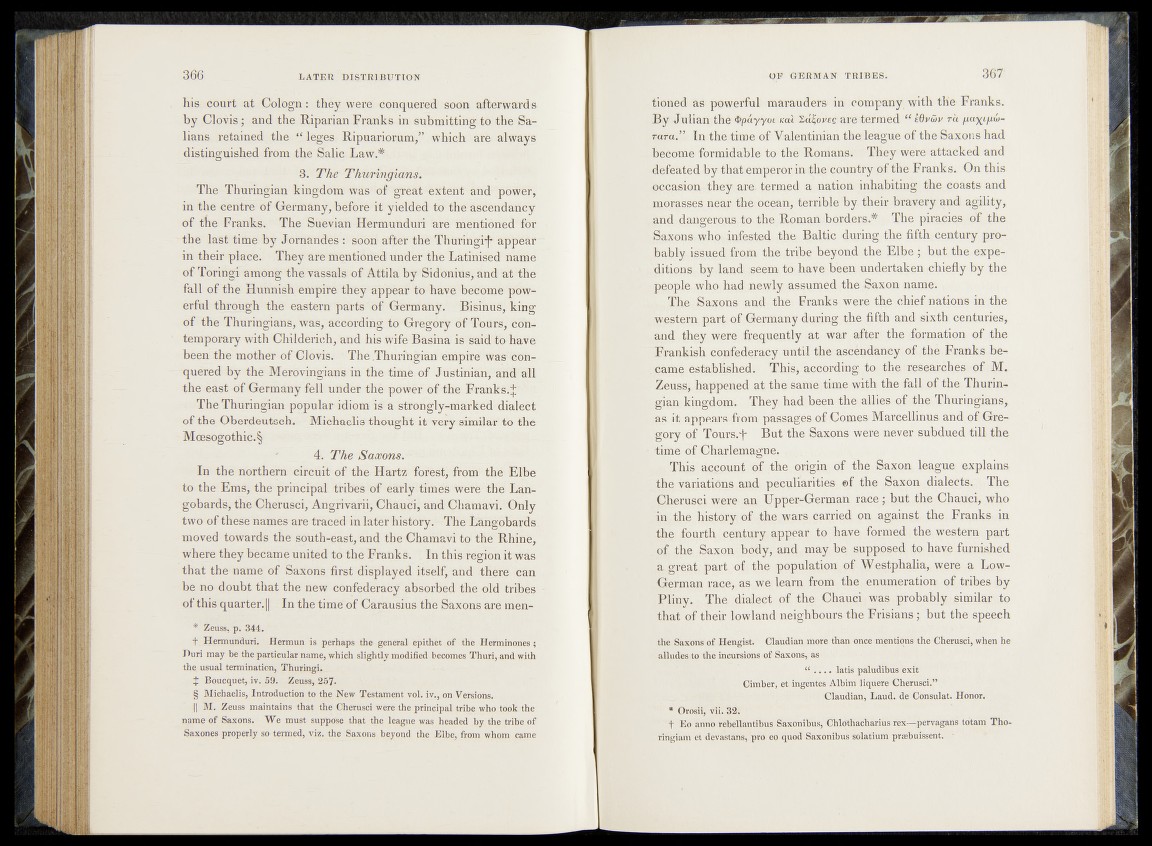
his Court at Cologn: they were conquered soon, afterwards
by Clpvis; and the Riparian Franks in submitting to the J u lians
retained tire, “ leges> Ripuariorum,” which are always
distinguished from the Salic Law.#
3. The Thuringians.
The Thuringian kingdom was ;,of great extent' and- power,
in the centre of Germany, before it yielded to1 the* Ascendancy
of the Franks.- The Suevian Ilermuuduri are mentibn’hcPfor;
the last time by Jornandes : soon after the Thurinjghf* appear
in their place. They are mentioned under the Latinised name
of Toringf among the vassals of Attila by Sidonius, and5 at the
fall of the Ilunnish empire they appear to have'bd^njfe*powerful
through the eastern parts of German^- BisinUs', king
of the Thuringians, was, according to Gregory o f1 To ur's^^extemporary
with Childerich, and his wife Basina fs^said to have
been the mother of Clovis. The .Thuringian empire» was^eon-
-quered by the Merovingians in the time of Justinian, and all
the east of Germany fell under the power of the Franks. '
The Thuringian popular idiom is' a strongly-marked dialect
of the Oberdeutseh. Michaelis thought” it very similar to the
Mcesogothic.§
4. The Saxons. -•
In the northern circuit of the Hartz forest, from the Elbe
to the Ems, the principal tribes of early times were the Lan-
gobards, the Cherusei, Angrivarii, Chauci, and Chamavi. Only
two of these names are traced in later history. The Jbhngobards
moved towards the south-east, and the Chamavi to the Rhine,
where they became united to the Franks. In this region it was
that the name of Saxons first displayed itself, and there can
be no doubt that the new confederacy absorbed the old tribes
of this quarter;|| In the time of Carausius the Saxons are rnen-
* Zeuss, p. 344.
t Hermunduri. Hermun is perhaps the- general epithet of the Herminones;
Puri may be the particular name, which slightly modified becomes Thuri, and with
the. usual termination, Thuringi.
£ Boucquet, iv. 59. Zeuss, 257-
§ Michaelis, Introduction to the New Testament vol. iv,, on Versions.
‘ || M. Zeuss maintains that the Cherusei were the principal tribe who took the
name of Saxons. We must suppose that the league was headed by the tribe of
Saxones properly so termed, viz. the Saxons beyond the Elbe, from whom came
tinned as powerful marauders in* chmpany with the Franks.
By Julian-the ^payyot' KairScilovec^are termed “ iQv&v to. fia\ifxw-
t-amai’’ Ip>th%ti!n0 e of 'Valentiffian the league of- the Saxon s had
p k o in e for mi dhMe|lt| the Romans/ They were attacked and
defeatedby thafeemperoFfin^lie cOU'nfry1 of the Franks. On this
feqasion-^h-qy^^pei -^teajeds a,^ n^t'fcnjhuhabiting- the coasts and
^.(MkseS^near. thje^ppj|Lp.,. t.er ijife|e|by:» fh ^|b ^ av ery and agility,
#nd. dangerous, to^h^Ronian,border^* The p i r a c i e s f h e
.^axpnst whkq / ^ f |s ^ d 1 fifth century pro-
■ b a b l ^ ^ strihq^fe^0n d ^ ^ E l b ^ but the expe-
^ ave keen unde,r“tak,pn chiefly by the
^^m|e,g\vho had £pCiyly4tjtssi^e^th^*fS^|paa name.
, s T h e , , n & t f c o s in .the
western part ofGermany duging;^eM‘fth and sixtbfg^turies,
and they - wpre^freqnentfly at war aifler^thp formations* of ;the
"Frankish cop^d^icyvuntil the ’a s c e n d a n c y F r a n k s -^1-,
.*camq,is|jjbrished. apCQrdingjto the, researches of M.
Zeuss, happened ,at^ktK‘4sa^rf^time with the fallt pfithe Thurin-
kgian;kingdom. They had^bpen^he: alffeipf^»Thuringians^
.as it appears from > pasS^gps-,Qf C.(mi©s>'Marcellinus and, ofiGre-
gory of ToUrs.f But the Saxons were never s.ubdued till the
'timeiyl Charlemagne.
This aegpunt of the origin of the S a x o% J^ |^ g explains,
the vacations ,and -^peculiarities ©f the Saxons dialects. The
Mberusci w;ere an Upper-German ijapb ;„but JhpuChauci, who
inrthe history of the .wars ^caipdpd .on against, the Franks in
tfie fourth century(appear;,tp have(, formedjthe. western part
"of, the Saxon body, and may be supppsedj.to.havje furnished
great, part of the population of .^estphalia, were a Low-
German race, as wqi learn from the^e^qeratior^ of tribes by
Pliny. The dialect pf the Chauci; was probably, sipailar to
that of their lowland neighbors the Frisians; but the speech
the Saxons of Bengist. Claudian more than once mentions the Cherusei, when he
alludes to the incursions of Saxons, as
^ > f t ; . . . latis pahidiMSbxit
* Cimber, et ingentes Albimi liquere Cherusei.”
M'iClaud'ia!n, Laud, de Consulat. Honor.
* Orosii, vii. 32,
; f Eo anno rebellantibus Saxonibiis, Chlothacharius rex—pervagans totam Tho-
' ritigiam et devastans, pro eo .quod Saxonibus solatium praebaissent. -